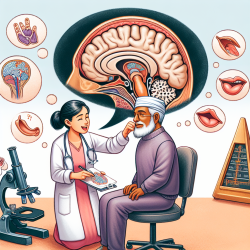Dysphagia, a disorder affecting the swallowing process, has significant implications for individuals across the lifespan. In Pakistan, speech-language therapists (SLTs) play a crucial role in managing this condition, yet their practices and the challenges they face remain underexplored. The recent study titled "Understanding Dysphagia Care in Pakistan: A Survey of Current Speech Language Therapy Practice" sheds light on the current state of dysphagia care in Pakistan and offers valuable insights for practitioners.
Key Findings from the Research
The study surveyed 101 SLTs in Pakistan, revealing critical information about their clinical practices, the signs and symptoms they assess, and the barriers and facilitators they encounter in dysphagia care. Here are some of the key findings:
- Clinical Experience: Most SLTs (79.4%) had five years or less of experience with dysphagia-related cases, and a majority (65.3%) worked across the lifespan.
- Assessment Methods: Informal clinical exams were more frequently used than instrumental assessments like VFSS and FEES. Common indicators assessed included choking, gagging, and coughing in children, and coughing, voice quality changes, and food residue in adults.
- Management Strategies: SLTs employed a combination of compensatory strategies and active rehabilitation. Modifying food and fluid consistencies was a common practice, although evidence supporting this is inconsistent.
- Service Delivery: Facilitators included supportive teams and access to resources, while barriers involved gaps in awareness, education, and guidance, as well as limited resources and referral systems.
Implications for Practitioners
The study's findings highlight several areas where SLTs can enhance their practice:
- Expand Knowledge and Skills: Given the reliance on informal assessments, SLTs should seek training and resources to incorporate more standardized and instrumental assessments where feasible.
- Collaborate and Advocate: Building stronger multidisciplinary teams and advocating for the importance of SLTs in dysphagia care can improve service delivery and patient outcomes.
- Focus on Psychosocial Aspects: Including caregivers in therapy sessions and referring patients to support groups can address the psychological impacts of dysphagia, which are often of greater concern to patients than medical factors alone.
Encouraging Further Research
This study underscores the need for ongoing research to develop evidence-based guidelines tailored to the Pakistani context. SLTs are encouraged to engage in research activities, collaborate with other healthcare professionals, and contribute to the growing body of knowledge in dysphagia care.
To read the original research paper, please follow this link: Understanding Dysphagia Care in Pakistan: A Survey of Current Speech Language Therapy Practice.










